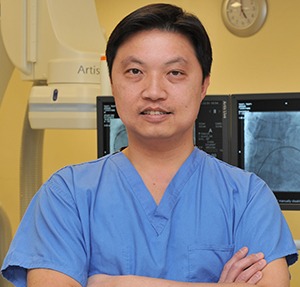
A new test to identify patients at risk of sudden cardiac death is being developed by researchers at the University of Leicester and Leicester’s Hopsitals following a £183,000 grant from national charity Heart Research UK.
Researchers at the University of Leicester will carry out tests among patients across the UK to see which of those at risk of sudden cardiac death would benefit from an implantable cardioverter defibrillator (ICD).
The research will also investigate if ICDs are currently being given to the patients who need them. The aim of the project is to develop a simple and cost-effective electrocardiogram (ECG)-based test which can more accurately identify people who need ICDs.
Andre Ng, from the University of Leicester, who is leading the team based at Glenfield Hospital, said the research was ultimately aimed at developing technology that can more accurately predict sudden cardiac death in patients and save lives by directing the most appropriate treatment to them.
“Whilst these deaths could be prevented with implantable cardioverter defibrillators (ICDs), assessing exactly who might benefit from these expensive devices remains challenging,” says Ng. “We are extremely pleased to have been given this grant from Heart Research UK as it allows us to springboard the work which we have been doing for the past few years to the next level.”
The study will follow 440 patients from 11 of the leading specialist cardiac centres across the UK and will involve an extra test performed on the heart when an ICD is implanted. Patients will be followed-up over 18 months and their cardiac risk scores compared with how often abnormal heart rhythms occur during an 18-month follow-up period.
Barbara Harpham, national director of Heart Research UK, says, “This developing research from the Leicester team could have real benefits in predicting who could be susceptible to sudden cardiac death. We aim, with the research we fund, to have a positive impact on patients as soon as possible, helping them to live healthier, happier and longer lives.”












